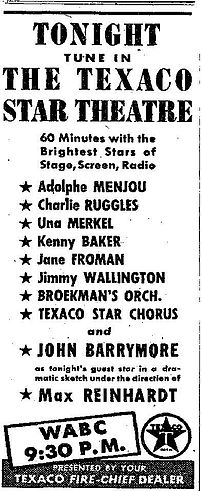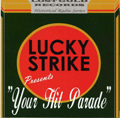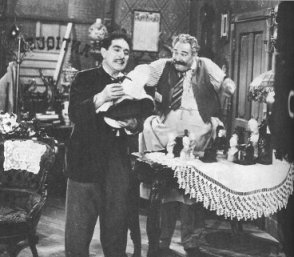
Texaco Star Theater is an American comedy-variety show, broadcast on radio from 1938 to 1949 and telecast from 1948 to 1956. It was one of the first successful examples of American television broadcasting, remembered as the show that gave Milton Berle the nickname "Mr. Television".
Tales of Fatima is an old-time radio transcribed show that was broadcast on CBS from January 8, 1949, to October 1, 1949.

Your Hit Parade was an American radio and television music program that was broadcast from 1935 to 1953 on radio, and seen from 1950 to 1959 on television. It was sponsored by American Tobacco's Lucky Strike cigarettes. During its 24-year run, the show had 19 orchestra leaders and 52 singers or groups.

The Red Skelton Show is an American television comedy/variety show that aired from 1951 to 1971. In the decade prior to hosting the show, Richard "Red" Skelton had a successful career as a radio and motion pictures star. Although his television series is largely associated with CBS, where it appeared for more than sixteen years, it actually began and ended on NBC. During its run, the program received three Emmy Awards, for Skelton as best comedian and the program as best comedy show during its initial season, and an award for comedy writing in 1961. In 1959 Skelton also received a Golden Globe for Best TV Show.

The Major Bowes Amateur Hour was an American radio talent show broadcast in the 1930s and 1940s, created and hosted by Edward Bowes (1874–1946). Selected performers from the program participated in touring vaudeville performances, under the "Major Bowes" name. The program later transitioned to television under host Ted Mack.

The Garry Moore Show is the name for several separate American variety series on the CBS television network in the 1950s and 1960s. Hosted by experienced radio performer Garry Moore, the series helped launch the careers of many comedic talents, such as Dorothy Loudon, Don Adams, George Gobel, Carol Burnett, Don Knotts, Lee Goodman, James Kirkwood, Jr., Lily Tomlin, and Jonathan Winters. The Garry Moore Show garnered a number of Emmy nominations and wins.

Melville Brandt was an actor and NBC staff announcer.

John Conte was an American stage, film and TV actor, and television station owner.

Life with Luigi is an American radio situation comedy series which began September 21, 1948, on CBS Radio and broadcast its final episode on March 3, 1953.

Alcoa Theatre is a half-hour American anthology series sponsored by the Alcoa Corporation and telecast on NBC at 9:30 pm on Monday nights from September 30, 1957 to May 23, 1960. For its first four months on the air, the title Turn of Fate was used as an umbrella title for Alcoa Theatre and its alternate-week counterpart, Goodyear Theatre.

Carleton Garretson Young was an American actor in radio, film and television.
Robert Illes is an American award-winning screenwriter, television producer, playwright and author.
The Chevrolet Tele-Theatre is an American anthology series that aired live on NBC Mondays at 8 pm EST from September 27, 1948 to June 26, 1950. The program presented both news headlines and live dramatic performances of either original plays or works adapted for television from the stage. Sometimes the show was referred to as Chevrolet on Broadway or The Broadway Playhouse; particularly when the program was presenting an adapted stage work from New York City's theatre scene.

The Silver Theatre is an American television series that was broadcast on CBS from October 3, 1949, to June 26, 1950, and was hosted by Conrad Nagel. It was also known as Silver Theater.

Telephone Time is an American anthology drama series that aired on CBS in 1956, and on ABC from 1957 to 1958. The series features plays adapted from short stories by John Nesbitt who hosted the first season. Frank C. Baxter became the host effective with the September 10, 1957, episode. He hosted the 1957 and 1958 seasons. A total of 81 episodes aired from April 1956 to March 1957 on CBS, and from April 1957 to April 1958 on ABC. The Bell Telephone System sponsored the series.
The Pepsodent Show is an American radio comedy program broadcast from 1938 to 1948, during the Golden Age of Radio. The program starred Bob Hope and Jerry Colonna, alongside Blanche Stewart, Elvia Allman, and a continuously rotating supporting cast of actors and musicians which included, for a time, Judy Garland, Frances Langford, and Desi Arnaz and his orchestra.
Campana Serenade is an old-time radio music program in the United States. It was broadcast on NBC from October 10, 1942 to April 10, 1943, and on CBS from September 4, 1943 to February 16, 1944.

William Post Jr. was an American actor and drama instructor. He was sometimes billed without the use of "Jr." following his surname.
The Amazing Mr. Tutt is an American radio "lighthearted legal drama" that was broadcast on CBS from July 5, 1948, through August 23, 1948.













